Featured Articles
Don King: The Last Roar of the Lion in Winter?
It has been a remarkable run for a remarkable character, truly an American original, unique even by boxing’s fast-and-loose, anything-goes tolerance and even compliant acceptance of outrageous behavior.
But Don King, he of the electrified hair, bombastic personality and streetwise cunning, has slowed down from full-throttle manipulation of boxing to a minor role that seems to shrink with each passing day. The “Teflon Don,” as he once was dubbed for his ability to unstick himself from the many lawsuits filed against him, is 83 now, a graying lion in winter. Forty-plus years of wheeling and dealing can sap the vitality from even the most driven of alpha males, and especially so if the aging go-getter is an octogenarian who no longer is dealing from a position of near-absolute control.
That familiar, bellowing roar – well, more of a heh-heh-heh cackle – now comes with the volume turned low. At least the message being barked out isn’t reaching as many listeners. Maybe that is because the man himself is simply tuckered out, and maybe because his depleted stable of fighters is basically down to one lead pony that, upon further inspection, is lacking the regal bloodlines and staying power of many of his predecessors. But regardless of their place in boxing’s pecking order, King’s fighters during his glory days were obliged to pledge fealty (and hefty percentages of their purses) to the boss as a condition of their servitude.
Some observers have made the mistake of writing off King in the past, but whenever it appeared he was becoming less relevant, he simply found a way to restock his talent pool with a fresh influx of elite attractions, more than a few of whom were lured away from rival promoters. If it is indeed possible for a slick enough huckster to sell sand to Bedouin tribesmen, it was a near-certainty that DK would find a way to run the largest, most profitable concession stand in the desert.
All of which makes tonight’s Showtime-televised pairing at the MGM Grand King’s last, best hope for an important toehold in the sport, WBC heavyweight champion Bermane “B. Ware” Stiverne (24-1-1, 21 KOs), and challenger Deontay Wilder (32-0, 32 KOs) more notable than it might be solely on its pugilistic merits. Should Stiverne – a 36-year-old Haitian, formerly based in Quebec City, Canada, now living in Las Vegas – lose a fight that is by no means a sure thing either way, it could have the effect of ushering King off to the side, once and for all.
But if King is indeed on his way out, he’s going the same way he came in, with heaping measures of defiance, bluster and bullspit.
”This program is America’s return to glory in the heavyweight division,” King harrumphed, ignoring the fact that only one fighter, the one he doesn’t control, is a United States citizen. “It’s going to be a great event. This is a fight to bring boxing back to where it should be, and the glory back to the heavyweight division that has been lacking for quite a while now.
“A guy named Bermane Stiverne is an extension to (Mike) Tyson – awesome, brutal, a devastating puncher.”
Perhaps Stiverne will be all of that on Saturday night, or at least show flashes of the form King has assured everyone he possesses in sufficient supply to be compared to iconic heavyweights Tyson, Larry Holmes, Evander Holyfield, George Foreman and Muhammad Ali, all of whom His Hairness promoted at one time or another. But it seems more plausible that Stiverne is a cut or two below that uppermost tier, more in line with such King roster-fillers as Tim Witherspoon, Greg Page, Bonecrusher Smith, Tony Tubbs and Tony Tucker, talented bench guys whom he had rounded up primarily to serve as opponents for his marquee attractions. It was standard practice for King to arrange title fights between two of his fighters, assuring that the only guaranteed winner after the last punch was thrown was … Don King.
It is a ploy also used by King’s longest-running and most-bitter competitor for promotional domination, Top Rank CEO Bob Arum, 83, who, on the surface, is everything that King is not. But while their pre-boxing experiences are hardly identical, their management objectives are eerily similar: Always, always be the one calling the shots and directing the play.
Forget Ali-Frazier; that series was a fleeting blip on the radar screen compared to the decades-long blood feud between Arum, the “master of trickeration,” as so dubbed by King, and his hulking, flag-waving nemesis with the mountain-range coif. But it says something about the arch-rivals that they occasionally got together to do business because, well, declaring intermittent truces was good business.
A couple of months prior to the April 8, 2006, matchup of King’s Zab Judah and Arum’s Floyd Mayweather Jr. in Las Vegas, the enemies-turned-temporary-allies held a remarkable press conference in Atlantic City, N.J., to not only chat up the upcoming fight, but to turn their verbal guns on a nagging irritant, then-Golden Boy CEO Richard Schaefer, whom each considered to be a threat to their established turf.
“If you were making a chart from zero to a hundred, Bob Arum – Harvard graduate, Kennedy raider, Jewish ethnic, got the complexion for the connection – would be the most likely to succeed,” chortled King as Arum sat close by, forcing a smile.
“Don King – African-American, ex-convict, served time in jail – on (a scale) of zero to 100, it would be 100 to zero for Bob Arum. But in reality, is hasn’t been that way because I’ve been extraordinary at what I do. Us playing off each other has been a blessing more than anything. At the end of the day, only the two of us are left standing. Collectively, the rest can’t tie our shoestrings.”
In the eight-plus years since that pronouncement, Arum has separated himself from King more than Dez Bryant putting a double-move on a confused rookie cornerback lacking top-end speed. Arum’s company remains a behemoth of the industry, with a deep roster ranging from the more-established likes of Manny Pacquiao, Timothy Bradley Jr., Nonito Donaire, Terence Crawford and Nicholas Walters to such emerging attractions Vasyl Lomachenko, Zou Shiming, Felix Verdejo and Jesse Hart … about 50 fighters in all.
And it’s not just the quantity and quality of Arum’s inventory that keeps Top Rank strong. Ever the globe-trotting entrepreneur, Arum has made Macau, China, boxing’s hot, new destination for major bouts, and the recent thawing of his company’s frosty relationship with Oscar De La Hoya and Golden Boy, facilitated in no small part by the departure of Schaefer, his King-like substitute as an object of derision, has further entrenched Top Rank as a major player going forward. Arum also has a successor waiting in the wings in Todd duBoef, his stepson, who for years has been groomed to keep the TR brand buffed and polished.
King’s operation hasn’t fared nearly so well by comparison.
The tried-and-true tricks King used to telling effect in the past – opening up a satchel of money, dumping it on a table, and telling a fighter raised in poverty that he had to sign multiple blank contracts with King if he wanted to leave with the booty, and maybe the keys to a new car – aren’t the guaranteed deal-closers that they once were. Nor is the race card King has been known to play with black fighters who were schmoozed into feeling more comfortable with one of their own.
Don King Productions moved from the Upper East Side of Manhattan – the tony section of New York that, rightly or wrongly, perceives itself as the center of the known universe – to Deerfield Beach, Fla., in the late 1980s. Once, DKP handled a Top-Rank-sized lineup of premier fighters, necessitating a staff of around 50 to keep the operation humming. Now, the number of employees has been pared to 10 or so, with many of King’s most trusted lieutenants having either died off or, sensing the seismic shift taking place within the organization, gotten out while the getting was good.
But the man himself remains in the game, even if marginalized, even if an increasing number of former employees and associates, having broken free from his iron grip, now excoriate him as a ruthless taskmaster whose public persona is as purposefully crafted as anything that has ever been sold to gullible consumers.
Bernard Hopkins was unhappily under contract to King when he won the middleweight unification tournament with a surprise (or so some thought), 12th-round stoppage of a King favorite, Felix Trinidad, on Sept. 29, 2001. It gnawed at Hopkins that the Sugar Ray Robinson Award, which had been commissioned to go to the ultimate victor, had been engraved with Trinidad’s name before the final. And if there is anything that can be said about B-Hop, it is that he files away all real and perceived slights, and draws upon them for inspiration as needed.
When Hopkins, no longer with King, was to take on King fighter Tavoris Cloud, the IBF titlist, on March 9, 2013, at the Barclays Center in Brooklyn, N.Y., the then-48-year-old Philadelphian, who would go on to score a unanimous-decision victory, reveled in the notion that he was going to shovel the last spadeful of dirt upon the professional grave of his onetime promoter.
“I am surprised that King agreed (to make the fight) because Cloud losing to me will shut down what’s left of King’s company,” Hopkins said. “He’s pretty much down to Cloud. Cloud is Don King’s last big hope.
“Who would have thought that I would have stayed around long enough to destroy Don King? I started the process with Tito (Trinidad). Look, I made a history of beating Don King fighters. Robert Allen, John David Jackson, William Joppy, Keith Holmes, Trinidad. That’s five so far. There’s probably more.”
Nor is Hopkins the only former King fighter who has told tales of chicanery and financial improprieties of a colossal magnitude, which served to mostly enrich the promoter instead of the guy eating the punches. Former heavyweight champion Tim Witherspoon filed a $25 million lawsuit against His Hairness in 1987, alleging that he had been bilked out of significant chunks of his purses. When Witherspoon, the WBA champ, fought Frank Bruno in London on July 19, 1986, for instance, HBO paid King $1.7 million to deliver “Terrible Tim,” and the Associated Press reported that his share of the pot would be $900,000, the same as Bruno’s. But although Bruno – a non-King fighter whom Witherspoon stopped in 11 rounds – received his full guarantee, ’Spoon was handed a check for $90,094.
“It’s like we’re racehorses,” Witherspoon, who after years of legal wrangling settled with King out-of-court for $1 million, said of his role as one of the King-controlled “Lost generation of heavyweights” in the 1980s. “They race us ’til we drop and then they shoot us. And if we win, they tie a blue ribbon around our neck.”
More damning accusations were cited, chapter and verse, in “Only in America: The Life and Crimes of Don King,” by Jack Newfield, which was published in 1995. In the book, Newfield, who died in 2004, wrote that Muhammad Ali was shorted about $1.2 million of his contracted $8 million purse for the horrific beatdown he suffered at the hands of Larry Holmes on Oct. 2, 1980. While a clearly diminished Ali was recovering, Newfield detailed how King got a trusted Ali associate, Jeremiah Shabazz, to bring “The Greatest” a suitcase filled with $50,000 and a contract that not only precluded him from pursuing punitive damages against King, but gave King the option to promote any of Ali’s future fights. Weary and confused, Ali signed the contract and took the cash.
By his own estimation, King has spent $30 million defending himself against lawsuits, and not only those filed by disgruntled fighters. The FBI went after him for tax evasion, among other things, but King beat the rap that landed Al Capone in Alcatraz. In 1995, he beat a nine-count indictment on insurance fraud. Almost without exception, King, claiming he was the target of jealous or unscrupulous adversaries, came away unscathed.
“They went down the list of every known charge conceivable to man,” he said after outpointing the feds on the tax-evasion beef. “Racketeering, skimming, kickbacks, ticket-scalping, fixing fights, preordaining fights, corrupting judges, all the way down to laundering money. Everything but the Lindbergh baby. Instead of using me as the true attestation of the American dream, they threw the book at me.”
The book missed King, as large as he is, but maybe Deontay Wilder will land the takeout shot to Stiverne’s jaw that will finish the job so many have taken upon themselves dating back to the 1970s. Then again …
There are two sides to every story, of course, and King has an array of accomplishments to counteract the impression that he is a shameless con artist who only takes and never gives anything back to the sport that made him a legend and instantly recognizable figure here, there and everywhere. He was inducted into the International Boxing Hall of Fame in 1997, which is a pretty big deal, even though some critics said his enshrinement was akin to electing Willie Sutton or John Dillinger to the banking hall of fame. But, DK’s acknowledged warts aside, it is also undeniable that he has promoted more than 500 world championship fights and made millionaires (90 or so, at last count) of numerous children of poverty who were handy with their fists. OK, joke if you must about how he showed all those people how to make a small fortune: Start out with a large fortune, then watch as Don King chipped away at it with a laundry list of dubious deductions.
But even the most persistent snipers who have always taken aim at King would have to admit that boxing would seem, well, a little less interesting with him totally absent from the picture. And he was totally in the picture during his decades-long heyday, hogging more on-camera face time than even today’s most ubiquitous grandstander, Al Haymon associate Sam Watson, who is as out there as Haymon, boxing’s hermit-like Svengali, is not.
When King – who had been prohibited from doing business in Atlantic City for seven-plus years while his insurance-fraud case was pending (he finally was acquitted) – returned to the Jersey shore with a Dec. 5, 1998, show headlined by the matchup of WBA bantamweight champion Nana Konadu and popular challenger Johnny Tapia at the new Convention Center, the focus was on you-know-who. In King’s world, he is always the centerpiece, with the fighters playing support roles.
“I don’t understand this. I’m the one who’s fighting, right?” a perplexed Tapia, who claimed Konadu’s title on a 12-round majority decision, said of the prefight press conference whose prevailing theme appeared to be “Don King makes triumphant return to Atlantic City!”
King has his familiar props and mannerisms, from the electrified hair to the little flags he always waves to the brandished stogie to the malaprops he sprinkles into his every turn at the microphone or even in casual conversation. Ask him a question, about anything, and a reporter is apt to get 15 minutes of stream-of-consciousness, with King randomly dropping such names as W.E.B. duBois, Frederick Douglass, Machiavelli and Sun Tzu, occasionally making you chuckle with a misstatement that, upon further reflection, seems part of a well-rehearsed act.
This was – and probably still is, even in his dotage – one very shrewd dude. When I introduced my father to him at the second Mike Tyson-Razor Ruddock fight in Las Vegas, King immediately turned on the charm. “So you are the daddy of one of the boss scribes!” he bellowed, enveloping my 5-6½ father in a bear-hug.
“He must like you,” my dad said as we walked away.
“Depends on the most recent story I wrote about him or one of his fighters,” I replied.
But I wondered then, and still do, if King was playing me, the media being as susceptible to mind games and flattery as anyone else. And now Bermane Stiverne could be the last twitching fish on the end of King’s line, ready to be reeled in along with a new generation of willing and malleable reporters whose first rule of journalism is the insatiable need to find the most interesting story, and to ride it hard.
After all these years, Don King – Mr. Only in America – remains a story that can still be milked. He and I probably wouldn’t have it any other way.
-

 Featured Articles3 weeks ago
Featured Articles3 weeks agoThomas Hauser’s Literary Notes: Johnny Greaves Tells a Sad Tale
-
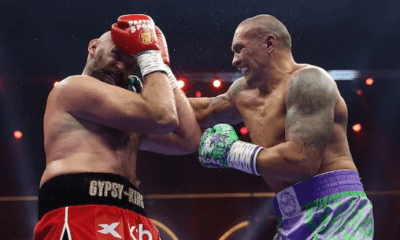
 Featured Articles2 weeks ago
Featured Articles2 weeks agoBoxing Notes and Nuggets from Thomas Hauser
-
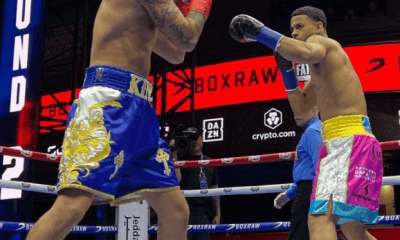
 Featured Articles4 weeks ago
Featured Articles4 weeks agoRolly Romero Upsets Ryan Garcia in the Finale of a Times Square Tripleheader
-
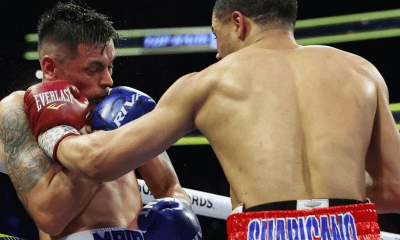
 Featured Articles4 weeks ago
Featured Articles4 weeks agoUndercard Results and Recaps from the Inoue-Cardenas Show in Las Vegas
-
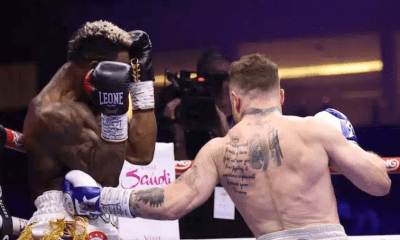
 Featured Articles4 weeks ago
Featured Articles4 weeks agoCanelo Alvarez Upends Dancing Machine William Scull in Saudi Arabia
-
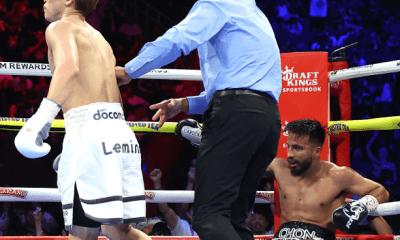
 Featured Articles4 weeks ago
Featured Articles4 weeks agoBombs Away in Las Vegas where Inoue and Espinoza Scored Smashing Triumphs
-
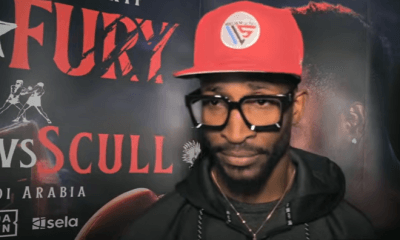
 Featured Articles4 weeks ago
Featured Articles4 weeks agoArne’s Almanac: The Good, the Bad, and the (Mostly) Ugly; a Weekend Boxing Recap and More
-
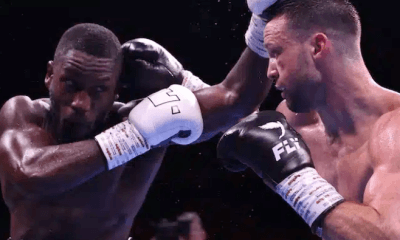
 Featured Articles1 week ago
Featured Articles1 week agoEkow Essuman Upsets Josh Taylor and Moses Itauma Blasts Out Mike Balogun in Glasgow




















Pingback: 2015 QUEBEC TAX TABLE Info « TAXES